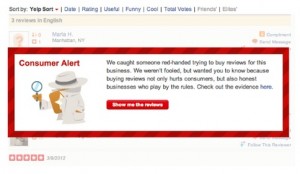 Today’s guest post is by Allen Mireles.
Today’s guest post is by Allen Mireles.
Our digital world is constantly evolving in response to user demand.
New tools and systems are being created and introduced almost daily.
And, almost as quickly as something is put into use, someone figures out how to get around it.
Gaming the system, no matter what the system, is rampant.
An estimated 282 million Americans are using the web in 2012.
Ninety-one percent of the adults online today use social media regularly.
Seventy percent of the adults who use social networks shop online.
And most of them are talking about what they are buying, thinking of buying or have already bought.
Some of them post reviews online. A positive online review can be worth its weight in gold. Leading businesses and marketers to try to figure how to encourage customers to post positive reviews.
Some businesses have offered compensation for good reviews. Some just ask their customers to comment online about their experiences.
This is Where it Gets Interesting
Online user reviews sites are plagued by false reviews. Gartner has predicted that by 2014, 10-15 percent of online reviews will be fake – bought and paid for by businesses hoping to influence prospective customers.
“Marketing, customer service, and IT social media managers looking to use reviews, fans and ‘likes’ to improve their brand’s reputation on social media must beware of the potential negative consequences on corporate reputation and profitability,” says Ed Thompson, vice president and distinguished analyst at Gartner.
Clearly We Have a Problem
Yet, what exactly constitutes a fake review? Aside from the obvious, someone posting a review or comment about something they have not experienced, is a review posted by someone who has been given access to a computer while inside the business considered a fake? Is a review posted by someone who has been given a discount for future purchases considered false? Is asking your customers to post online reviews wrong?

Yelp has just announced its Consumer Alerts initiative, an effort to stem the rising tide of fake online reviews. Yelp uses an automated review filter to identify false reviews and has already called out nine businesses for “shady practices;” i.e. paying for reviews. Yelp has posted its new Consumer Alert warning, edged in bright red, over each of these business profiles.
The text on the alert reads: “We caught someone red-handed trying to buy reviews for this business. We weren’t fooled, but wanted you to know because buying reviews not only hurts consumers, but honest businesses who play by the rules. Check out the evidence here.”
The Consumer Alerts will stay posted on business profiles for 90 days. Ninety days of being labeled a business that engages in “shady practices.” Ninety days of prospective customers seeing the Consumer Alert before any of the reviews. Ninety long days.
Yelp states that its “…automated review filter is working around the clock to flag these types of biased reviews…” Yelp is to be commended for stepping up to govern the quality of the content posted on its site. But what if a company’s reviews get flagged in the automated review filter but are genuine? What if the business has just asked their customer base to comment?
Automated Systems Can Make Mistakes
For a business, the risk of being misidentified as complicit in paying for fake reviews is very real, making engineered “positive word-of-mouth campaigns” potentially dangerous or problematic. Marketing, customer service, and social media managers need to be wary of offering any form of compensation for positive reviews, and be ready to manage negative consequences should they be identified as having tried to game the system.
What Does this Mean Going Forward?
To begin with, each online network has its own terms of service. This includes the user review sites such as Yelp. Read the terms of service. Understand what is allowed and what is not. Be cautious in offering compensation for positive reviews and mentions.
Beyond that, use common sense.
- Listen to what your customers and prospects are saying about your brand
- Answer (promptly) in an official capacity
- Show them that you are willing to engage in conversation online
- Create a plan of action in case – just in case – something goes wrong
If you embrace both positive and negative mentions, and aren’t afraid to use negative reviews as an opportunity to demonstrate your company’s responsiveness, chances are that you will recover from bad reviews.
What might be be more difficult to recover from though is 90 long days being stamped a shady player, or worse, a cheater.
Allen Mireles is vice president at Arment Dietrich and is based outside of Toledo. She has diverse expertise in healthcare IT, manufacturing, and education. You can follow her on Twitter at allenmireles, add her to your circles on G+, link to her on LinkedIn, or friend her on Facebook.
********************************************************************************************
IMPORTANT! IMPORTANT!
Because Google is no longer supporting Feedburner and some of you are not receiving your subscription), we have switched to Feedblitz.
That means, if you subscribe via RSS, you need to resubscribe.
If you subscribe via email, the switch happened automatically.
And if you are not a subscriber, what the heck is wrong with you? Get Spin Sucks every morning via email or RSS.